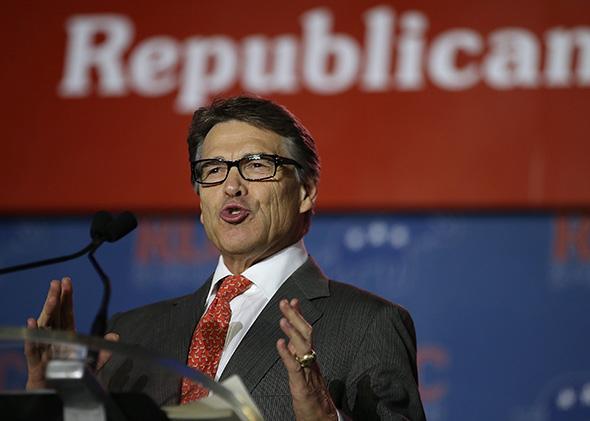Over the weekend, liberal and conservative commentators achieved rare bipartisan consensus in condemning the indictment of Texas Gov. Rick Perry as “unbelievably ridiculous,” legally thin, and potentially unconstitutional. Perry is accused of threatening to veto and then actually vetoing funding for the Travis County district attorney’s office, unless it got rid of its district attorney, who—in an embarrassing incident—pleaded guilty to drunk driving and arguably got off too easily. It’s worth noting that the same outrage expressed over the Perry indictment did not accompany the conviction of former Illinois Gov. Rod Blagojevich for trying to sell Barack Obama’s Senate seat, or the trial of former Virginia Gov. Bob McDonnell and his wife for allegedly taking $165,000 in gifts from a businessman selling snake oil, who was looking to curry political influence with the governor. But a similar problem of drawing the line between illegal conduct and politics as usual may set them both free. And it suggests prosecutors are in a tough position when they see conduct that fails the smell test but might not be illegal.
This seems to be the season for investigations of governors. New Jersey’s Gov. Chris Christie has his “bridgegate.” The U.S. attorney is investigating New York Gov. Andrew Cuomo’s potential interference with the Moreland Commission—a commission he created himself to investigate corruption. State prosecutors in Wisconsin have been investigating Gov. Scott Walker’s involvement in potentially illegal coordination of campaign finances between his political campaign and outside groups. And then, of course, there are McDonnell, Perry, and Blagojevich, as well as Connecticut Gov. John Rowland, who went to jail for graft, and Alabama Gov. Don Siegelman, who went to jail for bribery and fought his conviction (unsuccessfully) all the way to the U.S. Supreme Court. At least the endless prosecutions appear to target both Democrats and Republicans.
But the problem facing prosecutors, in the Perry case and the others noted above, is this: State officials have tremendous power, and many of them abuse that power for personal benefit. But many state officials also engage in unseemly conduct and hardball politics that do not clearly cross the line of illegality. In those cases, as I’ve written in relation to former U.S. Sen. John Edwards, former House Majority Leader Tom DeLay, and now Rick Perry, we run the danger of the criminalization of ordinary politics. And a prosecutor’s desire to make a name for herself, the potential for partisan prosecutions, and the public’s desire to ferret out corruption that it believes to be rampant all push prosecutors into pursuing sometimes novel or dubious legal theories against high public officials. There is very little incentive in the other direction.
Sometimes the cases are clear-cut because they involve the exchange of one’s office for purely personal benefits. Connecticut’s Rowland, for example, declared he let his “pride get in the way” when he “admit[ed] that he sold his office for more than $100,000 in chartered trips to Las Vegas, vacations in Vermont and Florida, and improvements at his lakeside cottage.” But other cases involve what appear to be political decisions or run-of-the-mill horse-trading, more so than personal benefit. Perry, for example, was certainly playing hardball with the Travis County district attorney’s office—a Democratic-dominated county with a public integrity unit that was investigating an ally of the governor. If Perry was abusing his power by threatening a veto, he could certainly be subject to impeachment. But reasonable legal minds across the ideological spectrum seem to agree that criminal charges seem unwarranted for what looks like politics as usual.
By the same token, to the extent Blagojevich’s conviction for trying to sell Obama’s Senate seat rested on a political (not personal) exchange, it may be that he too has done nothing illegal. The U.S. Court of Appeals for the 7th Circuit has been considering his appeal for eight months. And at oral argument, Judge Ilana Diamond Rovner asked prosecutors a version of precisely this question: “Where is the line that differentiates legal horse-trading from a federal offense that puts you in prison?” Don’t be surprised to see at least some of the convictions against Blagojevich reversed.
Consider the ongoing McDonnell prosecution on federal corruption charges. The state of Virginia inexplicably does not have a limit on the gifts that an elected official like McDonnell can take, so long as they are disclosed. But connecting those gifts to official action then taken by the governor is hard to do. Proving a quid pro quo is so difficult precisely because we don’t want to jail every politician who takes a campaign contribution or gift from someone who wants to curry favor.
Don’t be surprised to see the jury reject at least some of the charges against McDonnell, and you can blame the commonwealth of Virginia for not instituting a common-sense ban on taking big gifts from people trying to curry favor with the governor.
It’s not that we want prosecutors to stop investigating elected officials for corruption. Such investigations are necessary to ferret out self-interested deals like former member of Congress Randy “Duke” Cunningham, who took a yacht from a defense contractor with business before his committee, or former member of Congress William Jefferson, who took cash in exchange for steering business toward those who were bribing him.
But we need to look very skeptically on indictments where the main allegation is that the politician engaged in perfectly legal hardball politics.
We already inject the legal system into so much of our political campaigns. We should reserve the machinery of criminal law for only the most egregious cases of self-interest and personal benefit. For everything else, we should leave it to the power of legislatures to impeach or remove members, and for the outraged public to throw the bums out.
